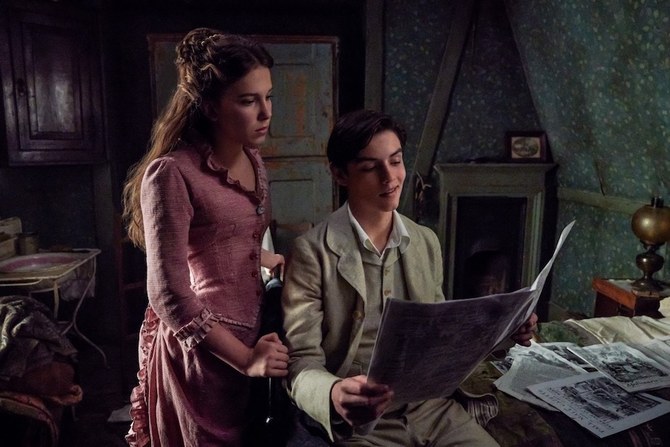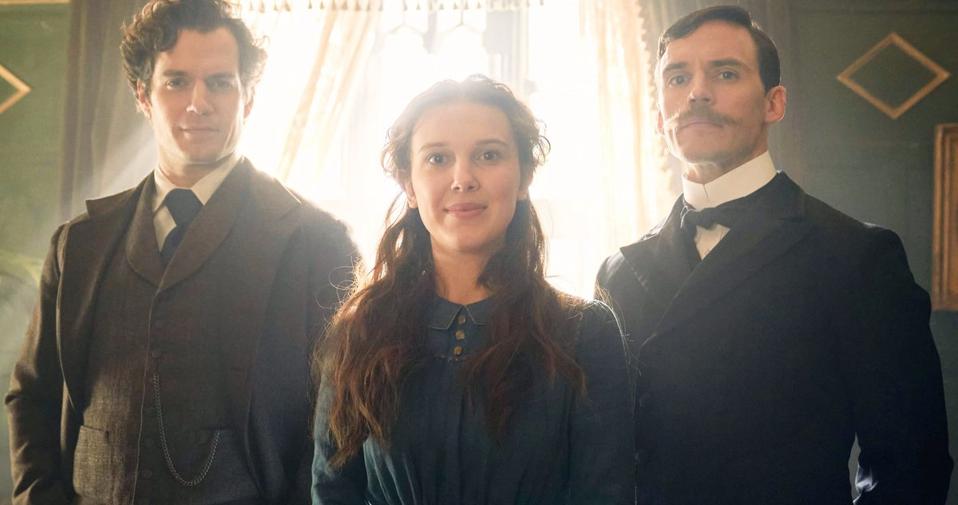Enola Holmes (Millie Bobby Brown) is the younger sister of the world famous detective Sherlock (Henry Cavill), who grew up on a country estate with her mother (Helen Bonham Carter), a woman of willful and progressive. Instead of embroidery and cooking, she taught her daughter archery and jiu-jitsu, and one day she simply disappeared without a trace, leaving only clues to her whereabouts. The brothers, who returned to the estate, decide to put Enola in the house of noble maidens, but she runs away and goes to look for her mother – and on the way she meets a young viscount (Louis Patridge), who somehow wants to kill. And this is somehow connected with the House of Lords and the bill of reform, which will give the right to vote to those who previously had no such right.

The trademark “Sherlock Holmes” has long been a paradise for interpreters – Doyle’s works are already in the public domain, that is, they do not fall under the copyright law, but for a century and a half do not lose relevance. That’s why we have eccentric “Holmes and Watson”, and melancholy “Mr. Holmes”, lively series “Sherlock” and revisionist “Elementary”. Among all variations on the theme “Enola Holmes” – based on the book series of the same name – doesn’t look the most radical. It is not about Sherlock at all, but about his little sister, whom Conan Doyle somehow forgot to mention.

The trademark “Sherlock Holmes” has long been a paradise for interpreters – Doyle’s works are already in the public domain, that is, they do not fall under the copyright law, but for a century and a half do not lose relevance. That’s why we have eccentric “Holmes and Watson”, and melancholy “Mr. Holmes”, lively series “Sherlock” and revisionist “Elementary”. Among all variations on the theme “Enola Holmes” – based on the book series of the same name – doesn’t look the most radical. It is not about Sherlock at all, but about his little sister, whom Conan Doyle somehow forgot to mention.

Moreover, the figure of Sherlock as such here is not that the plot is important. It’s obvious that Enola Holmes could be, for example, Enola Smith, and the sense wouldn’t be lost from it – the same adventurous teenage story in the scenery of the XIX century. In general, there’s not much detective intrigue here, and the main character doesn’t sparkle with deduction, preferring to solve problems in a more emotional and breakthrough way. Which, in part, is the idea of the picture: even Sherlock appears here as a character more feeling, not cold and not cynical.

Holmes is important here first of all as a point of reference, as a patriarchal symbol that allows Enola to reconstruct the myth about the detective from the point of view of feminist optics – proclaiming not only feminine over masculine (it’s funny, that this is the second iteration of Conan Doyle, in which Sherlock out of nowhere appears more intelligent in all respects sister), but also sensual over rational. And in the books about Enola Sherlock was shown as a fierce chauvinist, but in the filming the focus is a bit confused: the idols of millions were afraid to be exposed in a bad light, and as a result, only Mycroft – a snooty ultra-right aristocrat – is exposed to scum.

The very idea of such interpretation is not bad or good, after all, what to do, such stories dictate the spirit of our time. The other question is that if “Enola Holmes” had done everything correctly, nobody would have noticed the influence of the “left optics”, and the necessary meanings would have been absorbed with the fervent adventuristic plot. But as a light teen movie it works only partially – yes, everything is colorful, fun, and playwright Jack Thorne clearly knows how to write such marshmallow costume adventures (he also made “Aeronauts” and “Dark Beginnings”), and director Harry Bradbeer dilutes the pathos with comical destruction of the fourth wall (a reception that he clearly watched at the series “The Crap”, where he worked himself, and which in “Enola Holmes” very quickly gets bored). And yet here the supremacy of meaning over action is too noticeable.

At least because the two storylines of “Enola Holmes” – with the search for the teenage viscount and the mother of the main character – in the end turn out not to be connected. The first one is needed, understandably, as an “entertainment” part, but the second one has an exclusively ideological meaning. It turns out that Enola’s mother has gone to radical suffragettes and is going to blow something up in order to give the women a voice. The film obviously does not judge this – and it turns out that the children’s adventure film as if justifies terrorism. If terrorism is for a good cause, of course. However, the Viscount line eventually ends with such a Zumer morality: that the old people should be at peace by now and not to prevent the young to decide the fate of the country. In general, a fair comment, but it does not mean that for his sake, it is necessary to turn a costume Adventure into a metaphor for fighting with Braxit. But here, as they say, whoever has what hurts – and liberally minded British creators now all have the same thing.

